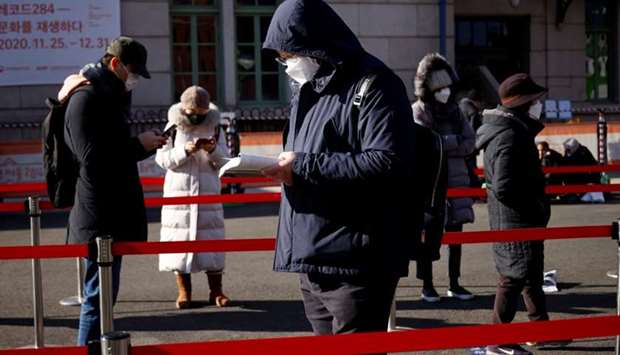* S.Korea aims to approve vaccine in 40 days
* S.Korea has ordered enough shots to cover entire population
* Ban on social groups expanded as third wave infections rise
South Korea is reviewing AstraZeneca's request for approval of its coronavirus vaccine, as it expands a ban on private gatherings of more than four people to the whole country with daily cases topping more than 1,000 in four days.
South Korea's drug safety ministry said it will aim to approve the British shot for emergency use in 40 days. The approval would mark the first for the country, which has been grappling with a prolonged surge in infections during the latest wave that has led to a sharp increase in deaths.
South Korea signed a deal in December with AstraZeneca to secure 20 million doses of its vaccine, with the first shipment expected as early as January.
It also has deals with three other drugmakers - Pfizer Inc , Johnson & Johnson’s Janssen, Moderna Inc - and the global Covax initiative, backed by the World Health Organization.
The country has secured 106 million doses to allow for coverage of 56 million people, more than the 52 million residents of the country, Korea Disease Control and Prevention Agency (KDCA) director Jeong Eun-kyeong told a briefing.
Authorities plan to start vaccinations in February, with health workers and vulnerable people first in line, but the government has been criticised for that schedule in light of vaccinations underway in the United States and European Union.
The AstraZeneca shot is already approved in Britain, Argentina, El Salvador, and India. It is cheaper and can be stored at fridge temperature, which makes it easier to transport and use than some rival shots, such as one from Pfizer.
The Oxford/AstraZeneca vaccine, however, has been plagued by uncertainty about its most effective dosage ever since data published in November showed a half dose followed by a full dose had a 90% success rate, while two full shots were 62% effective.
In November, SK Bioscience, 98% owned by SK Chemical , received regulatory approval to begin human clinical trials of AstraZeneca's experimental vaccine, having agreed in July to manufacture the shots to help the British company build global supplies.
South Korea reported 1,020 new coronavirus cases as of midnight Sunday, bringing the total to 64,264 infections, with 981 deaths, according to the KDCA.
A ban on small private gatherings that was in place in the Seoul greater area was expanded nationwide until Jan. 17.
"The reason we have expanded the ban on gatherings of four or above across the country is because gathering of people itself is far more dangerous than a specific venue," Jeong said.
The extended social-distancing rules imposed on Seoul and neighbouring areas include curbs on churches, restaurants, cafes, ski resorts and other venues.
More than 60% of South Korea's cases are from Seoul, Gyeonggi province and city of Incheon, with mass cluster outbreaks centred around nursing homes and prisons.
Prime Minister Chung Sye-kyun called for an all-out effort to prepare for the country's vaccination programme.
"The KDCA should be perfectly ready for the entire process the moment the vaccine arrives - the distribution, storage, inoculation and follow-ups," Chung told a government meeting.
He also called on the related health, safety and transport ministries to help speed up the process so to not face the sorts of problems seen in the United States and some countries in Europe.

A man reads a book while waiting in a line to undergo coronavirus disease test at a coronavirus testing site which is temporarily set up in front of a railway station on Christmas day in Seoul, South Korea, December 25, 2020
